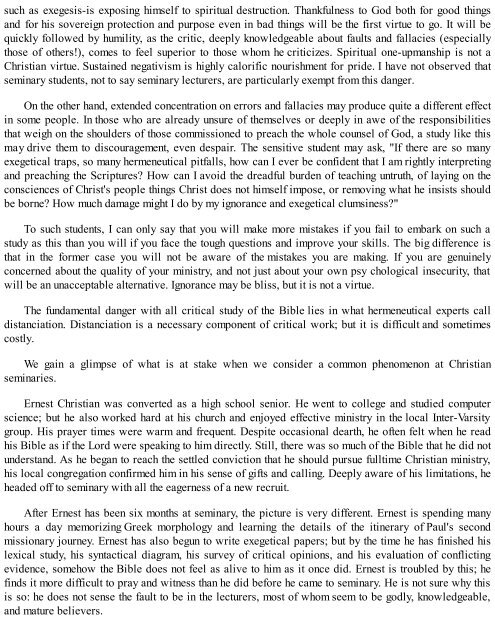Exegetical Fallacies - D. A. Carson
Exegetical Fallacies - D. A. Carson
Exegetical Fallacies - D. A. Carson
You also want an ePaper? Increase the reach of your titles
YUMPU automatically turns print PDFs into web optimized ePapers that Google loves.
such as exegesis-is exposing himself to spiritual destruction. Thankfulness to God both for good things<br />
and for his sovereign protection and purpose even in bad things will be the first virtue to go. It will be<br />
quickly followed by humility, as the critic, deeply knowledgeable about faults and fallacies (especially<br />
those of others!), comes to feel superior to those whom he criticizes. Spiritual one-upmanship is not a<br />
Christian virtue. Sustained negativism is highly calorific nourishment for pride. I have not observed that<br />
seminary students, not to say seminary lecturers, are particularly exempt from this danger.<br />
On the other hand, extended concentration on errors and fallacies may produce quite a different effect<br />
in some people. In those who are already unsure of themselves or deeply in awe of the responsibilities<br />
that weigh on the shoulders of those commissioned to preach the whole counsel of God, a study like this<br />
may drive them to discouragement, even despair. The sensitive student may ask, "If there are so many<br />
exegetical traps, so many hermeneutical pitfalls, how can I ever be confident that I am rightly interpreting<br />
and preaching the Scriptures? How can I avoid the dreadful burden of teaching untruth, of laying on the<br />
consciences of Christ's people things Christ does not himself impose, or removing what he insists should<br />
be borne? How much damage might I do by my ignorance and exegetical clumsiness?"<br />
To such students, I can only say that you will make more mistakes if you fail to embark on such a<br />
study as this than you will if you face the tough questions and improve your skills. The big difference is<br />
that in the former case you will not be aware of the mistakes you are making. If you are genuinely<br />
concerned about the quality of your ministry, and not just about your own psy chological insecurity, that<br />
will be an unacceptable alternative. Ignorance may be bliss, but it is not a virtue.<br />
The fundamental danger with all critical study of the Bible lies in what hermeneutical experts call<br />
distanciation. Distanciation is a necessary component of critical work; but it is difficult and sometimes<br />
costly.<br />
We gain a glimpse of what is at stake when we consider a common phenomenon at Christian<br />
seminaries.<br />
Ernest Christian was converted as a high school senior. He went to college and studied computer<br />
science; but he also worked hard at his church and enjoyed effective ministry in the local Inter-Varsity<br />
group. His prayer times were warm and frequent. Despite occasional dearth, he often felt when he read<br />
his Bible as if the Lord were speaking to him directly. Still, there was so much of the Bible that he did not<br />
understand. As he began to reach the settled conviction that he should pursue fulltime Christian ministry,<br />
his local congregation confirmed him in his sense of gifts and calling. Deeply aware of his limitations, he<br />
headed off to seminary with all the eagerness of a new recruit.<br />
After Ernest has been six months at seminary, the picture is very different. Ernest is spending many<br />
hours a day memorizing Greek morphology and learning the details of the itinerary of Paul's second<br />
missionary journey. Ernest has also begun to write exegetical papers; but by the time he has finished his<br />
lexical study, his syntactical diagram, his survey of critical opinions, and his evaluation of conflicting<br />
evidence, somehow the Bible does not feel as alive to him as it once did. Ernest is troubled by this; he<br />
finds it more difficult to pray and witness than he did before he came to seminary. He is not sure why this<br />
is so: he does not sense the fault to be in the lecturers, most of whom seem to be godly, knowledgeable,<br />
and mature believers.



